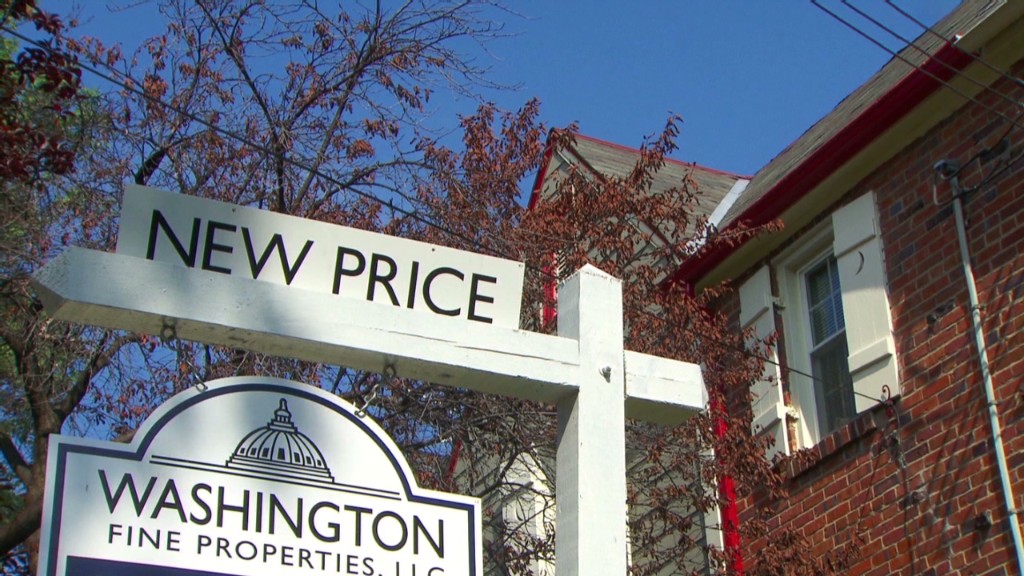
In many hot housing markets, bidding wars have been breaking out on a regular basis -- and some house hunters are getting beaten out time and again.
But it's not always about who has the most money. Sellers will accept lower offers if it means less hassle.
"What sellers really don't want to do is waste time," said John Walsh, president of Connecticut-based lender, Total Mortgage.
That means getting pre-approved for a mortgage and having all your paperwork -- your pre-approval, proof of income, work history and bank statements -- in hand. It also helps to have your lender at the ready so you can act fast.
Related: Priced out: 'I can't afford a home in my town'
But first you have to beat out all of those other bidders.
Here's how you can win over a seller and get the house you want:
Pay with cash. The best way to get a seller's attention is with cold hard cash. That is, if you can afford it.
In fact, all-cash sales have become extremely common, representing more than 40% of recent sales.
Ever since the housing meltdown, getting a mortgage has become a longer and more arduous process. Securing a loan can take weeks -- and there is always the chance it will fall through.
With all-cash offers, sellers are sure the buyer is qualified, said Walsh. And they won't have to wait through a long, drawn-out loan approval process.
Depending on the market and the seller's situation, they may even accept a lower offer just because it's in all cash.
Get your mortgage ready in advance. Don't have a ton of cash to put on the table? Try pre-underwriting a mortgage instead.
With pre-underwriting, lenders take the pre-approval process a step further by reviewing all of the income and asset documentation that they would typically need to approve a mortgage.

Sellers look favorably on pre-underwritten offers because they don't have to worry that the buyer's mortgage application will be rejected. All that needs to be done after the contract is signed is to complete an appraisal.
Some lenders even offer a guarantee that if they can't complete the transaction because they made a mistake or if lending rules have changed, they will refund the buyer's deposit.
Be flexible (but not foolish) with contingencies. Contingencies are clauses that allow buyers to back out of deals if specified conditions are not met. A bidder will sign a contract to buy a home contingent on the appraisal coming in at or over the selling price, for example.
Another common contingency clause is the right to back out if you can't find a buyer for your home. In hot markets, buyers often waive this right because they figure it should be easy to sell their old home quickly. In less heated markets, you could get stuck paying two mortgages.
Related: Millennials squeezed out of buying a home
One contingency you should think twice about before waiving is the home inspection. Should the inspector discover a major problem, such as widespread termite damage or a badly cracked foundation, it could cost far too much to fix. You want to know that before making a commitment you can't back out of, said Nicholas.
Be first. See the home as soon as it comes on the market. That way, you can get your bid in early and preempt later offers.
Real estate website, Zillow, has a new service that can help. Its "coming soon," tool enables real estate agents to signal that they're about to put a home up for sale. Homebuyers can find these potential properties by neighborhood or city.
Agree to outbid everyone. Do you really want the place? You can outmatch every other bidder by creating a contract with a so-called "escalation clause."
The clause basically states that you will pay $1,000 or $10,000 more than whatever the highest bidder offers.
So if the seller gets an offer for $200,000, your bid will automatically jump to $201,000 if you have an escalation clause.
Related: 'I've been priced out of downtown Detroit'
The danger with escalation clauses is twofold. "You never really know if the other offer is real," said Wei Min Tan, an agent with Rutenberg Realty in New York. "Sellers can ask someone to submit an offer just to get the buyer to raise their bid."
The second problem is that the final home price may be a lot higher than the appraised value of the home. That could jeopardize the mortgage or force you to come up with a lot of cash to make up for the shortfall.
One way to prevent that from happening is to place a cap on the bid, offering to pay no more than 10% or 20% above the original asking price.
Using a cap means, however, that you may not end up with the home in the end.


